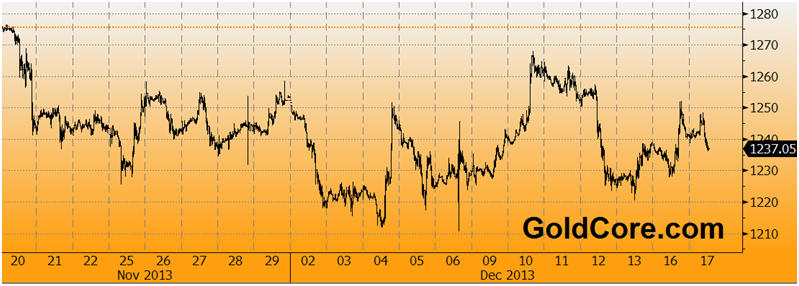As we noted earlier today, if there was one piece of news that could tip the scales away from a December taper announcement, it was a November inflation number that came in below expectations. Which it did: the headline November inflation print came in unchanged, on expectations of a 0.1% increase for the month, and up 1.2% for the year, below the 1.3% expected. However, before you BTFATH, note that core inflation – the Fed’s preferred metric – actually was higher than expected, with prices ex food and gas, rising 0.2% in November on expectations of a 0.1% increase. Indeed, looking at the components, the headline inflation number was dragged down by gasoline prices which dipped 1.6% in November and overall Energy costs which fell 1.0%. Also notable: apparel inflation was -0.4% in November – the third consecutive month of declines. However, back to the core number, annual inflation was up 1.7% Y/Y just shy of the Fed’s target, while core service inflation is up 2.4%.


Breakdown by component:

The breakdown of the key components from the report:
Food
The food index rose 0.1 percent in November, the same increase as in October. The index for food at home was unchanged, with major grocery store food groups mixed. The index for fruits and vegetables declined in November, falling 0.7 percent after rising in October. The indexes for meats, poultry, fish, and eggs and for nonalcoholic beverages also declined in November, each falling 0.2 percent. The index for cereals and bakery products, which declined in October, was unchanged in November. The index for other food at home rose in November, increasing 0.5 percent, and the index for dairy and related products rose 0.4 percent in November after falling in October. The food at home index has risen 0.6 percent over the last 12 months, the smallest 12-month increase since June 2010. The index for meats, poultry, fish, and eggs has posted the largest increase of the six major grocery store food groups over the last year, rising 2.8 percent. The index for nonalcoholic beverages has declined the most, falling 1.8 percent. The index for food away from home rose 0.3 percent in November, its largest increase since
April, and has risen 2.1 percent over the last year.
Energy
The energy index declined 1.0 percent in November after falling 1.7 percent in October. The gasoline index, which fell 2.9 percent in October, declined 1.6 percent in November. (Before seasonal adjustment, gasoline prices fell 3.3 percent in November.) The index for natural gas also declined, falling 1.8 percent in November; this was its fifth decline in the last 6 months. Other energy indexes increased, however. The electricity index rose 0.3 percent in November, its third consecutive increase. The index for fuel oil rose 0.4 percent in November after declining in October. The energy index has declined 2.4 percent over the last year, with the gasoline index down 5.8 percent and the index for fuel oil decreasing 4.1 percent. The electricity index has risen 2.9 percent over the last year, and the index for natural gas has increased 1.0 percent.
All items less food and energy
The index for all items less food and energy rose 0.2 percent in November after rising 0.1 percent in each of the 3 previous months. The shelter index rose 0.3 percent in November after a 0.1 percent increase in October. The rent index increased 0.2 percent, while the index for owners’ equivalent rent increased 0.3 percent. The index for lodging away from home rose 2.9 percent in November after declining 3.1 percent in October. The index for airline fares continued to rise, advancing 2.6 percent in November after a 3.6 percent increase in October. The recreation index rose 0.2 percent, and the index for used cars and trucks advanced 0.1 percent. The index for medical care was unchanged in November, with both the medical care commodities and medical care services components unchanged. The apparel index continued to decrease, falling 0.4 percent, its third consecutive decline. The index for household furnishings and operations fell 0.2 percent in November, as did the tobacco index. The index for new vehicles declined 0.1 percent for the second consecutive month.
The index for all items less food and energy increased 1.7 percent for the 12 months ending November. Indexes that have increased at a faster rate include airline fares (4.2 percent), shelter (2.4 percent), and medical care (2.2 percent). Indexes that increased more slowly or declined include household furnishings and operations (-1.4 percent), apparel (-0.1 percent), and new vehicles (0.6 percent).
So to summarize: if one looks at the headline CPI number, which the Fed has repeatedly said it does not, Taper may be delayed. If one looks at the Fed’s preferred core number, however, the Taper may still be very much on for December.

<
a href="http://da.feedsportal.com/r/184841691153/u/49/f/645423/c/34894/s/34eb1775/sc/22/kg/369/rc/1/rc.htm">





via Zero Hedge http://feedproxy.google.com/~r/zerohedge/feed/~3/d4FxlnFFhXc/story01.htm Tyler Durden
 It’s going to take Spokane,
It’s going to take Spokane,














 In the 2002 sci-fi noir film Minority
In the 2002 sci-fi noir film Minority

